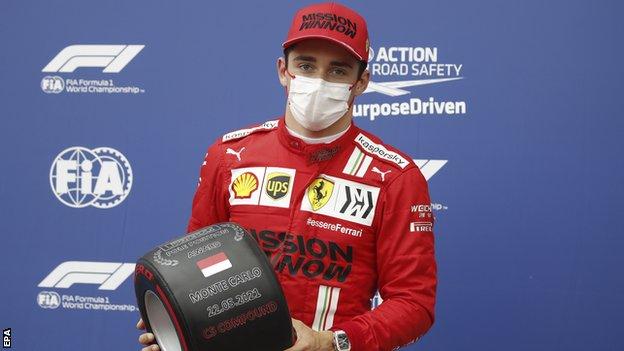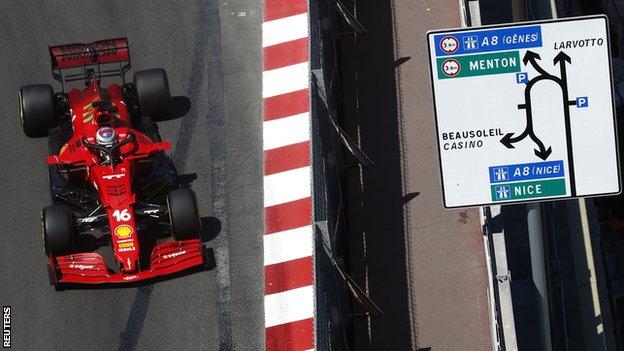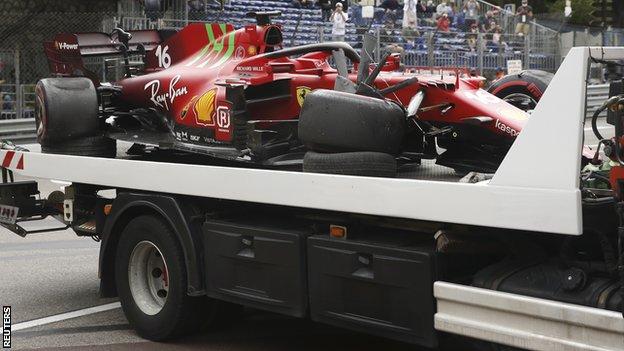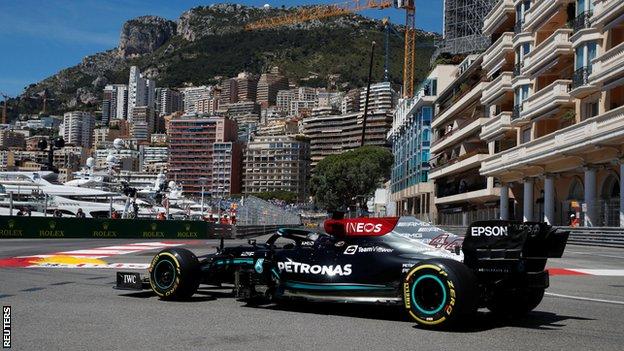
Ferrari driver Charles Leclerc was an anxious man as he left the Monaco Grand Prix track on Saturday evening, not knowing whether he will keep the pole position he secured for his home race.
The 23-year-old, who grew up a stone’s throw from the famous track, came out on top in a thrilling and, to some degree, controversial qualifying session.
But the crash that brought the session to a premature end, when Leclerc made a mistake heading into the second Swimming Pool chicane and buried his Ferrari in the barriers on the exit, had two contrasting outcomes.
It prevented Leclerc’s closest rivals – Red Bull’s Max Verstappen, Mercedes’ Valtteri Bottas and the second Ferrari driver Carlos Sainz – having the chance to snatch pole away. But it also badly damaged Leclerc’s Ferrari, and raises the possibility he could yet lose his place at the front of the grid on Sunday.
An initial inspection by Ferrari on Saturday evening revealed no serious damage to the car’s gearbox. But it will be looked at again on Sunday morning, when the team will decide whether it can be used in the race. If they feel they need to replace it, Leclerc will be given an automatic five-place penalty, and lose his maiden hometown pole.
For some on social media, where there were conspiracy theories about the crash, that would feel that like justice.
But this did not appear a situation as suspicious as 2014, when Nico Rosberg ran into the escape road at Mirabeau, removing the chance for his Mercedes team-mate Lewis Hamilton to beat him to pole, let alone that in 2006, when Michael Schumacher was demoted to the back of the grid for very obviously parking his Ferrari at Rascasse to prevent a number of drivers beating him.
Within Formula 1, there was nothing like the outcry and debate that surrounded those incidents.
As Mercedes F1 boss Toto Wolff put it: “I don’t think Charles [deliberately] put it in the wall today, because there is too much at stake.”

A most unexpected grid line-up
Ferrari – to the surprise of many, including themselves – have been absolutely competitive all weekend in Monaco, at the fifth race of a season so far dominated by Mercedes and Red Bull.
The Monaco track layout, with 19 corners crammed into a little over two miles, could not have been better designed for this year’s Ferrari, which has proved very quick whenever a track turns but is slow down the straights.
Both Leclerc and Sainz have been right up at the sharp end all weekend, and went into qualifying looking like they were serious contenders for pole position.
In the end, it was Leclerc – who has gained a reputation since his debut in 2018 as one of the very fastest F1 drivers over one lap – who delivered when it mattered.
He was quickest in the second session, and quickest again on the first laps in the final top 10 shootout, on which he had an advantage of 0.24 seconds over anyone else.
Leclerc’s final run was not going so well. He was down on his previous time in the first half of the lap, and trying to make up for it when he lost control.
A few corners behind him, Verstappen was 0.102secs up on his previous run as he went into the tunnel. Then the red flags came out. This prompted an extremely sweary radio message, in which the Dutchman vented his considerable frustration – he felt pole had been within his grasp. As did Bottas and Sainz. But, as Verstappen said afterwards: “That’s all ifs, buts and maybes.”
As for the crash, Leclerc was adamant it was a genuine accident.
“I took too much the inside on my fast lap – if you watch it, I think I touched the wall, too, but not as hard as on the second timed lap,” he said. “I tried to go for a bit more on the second lap and I basically bounced it off. But it was a misjudgement.
“I can tell you that if it was done on purpose, I would have done it a lot more cleverly and not gone at full speed into [the barrier] and risking breaking the gearbox. So, no, it was definitely not on purpose.”

Unlike with Schumacher back in 2006, no one publicly accused him of underhand tactics.
Alpine driver Fernando Alonso – the man who was on course to beat Schumacher that day before the Rascasse incident, and who ultimately inherited pole – was watching events this year on television, having been knocked out in the first session.
“Today it didn’t change anything,” Alonso said. “Verstappen was purple [fastest of all on the timing screens] on the first sector; that was the only one [who had a chance to beat him]. All the others were coming worse. So I don’t think there was a big drama on this.
“In 2006, it was very different, I guess. There were a lot of people going purple and it was not a crash.
“This is not that the pole-sitter wanted to crash or something strange happened. He was pushing, he crashed. The only debate can be if that car [should be allowed to] be repaired in parc ferme and go on pole position. But the rules allow that so we all know that so [there is] nothing we should say. It is OK.”
This last point is a reference to other categories, in which a driver who causes a red flag in a qualifying session loses his fastest time – to remove the temptation to do what Schumacher did in 2006.
Wolff said that was an “intelligent rule” and a “nice incentive to make sure that all the polemic such a situation provokes is out of the question because nobody could doubt it”.
He added: “Like with all the incidents we have seen in the past in Monaco, only the driver will ever know what happened. I doubt Charles would make himself detonate in the guardrail which could cause even more damage to his car. And I guess gearbox damage is possible.
“We think that probably we wouldn’t have had it. But it is what it is. It is certainly a good story that Charles is on pole.”
Hamilton with a fight on his hands
Unusually, Hamilton was not a contender in the fight for pole. The world champion, who leads Verstappen by 14 points in this year’s title chase, starts seventh after a difficult session in which he could not get his tyres up to the correct working temperature.
Hamilton, as you might imagine, was not a happy man afterwards. He is not one for criticising his team in public, but he came as close as he has done for a long time after this.
“There will be some tough discussion I have with my engineers tonight or maybe after the weekend,” he said, “because there are things that should have been done but haven’t been done. We will learn from it and come together stronger in the next race.
“It is a little frustrating, but it is what it is. I can’t really say too much about it. This is a team and I don’t want to be critical of the team, but behind closed doors I will be and we’ve got to work harder.”
Wolff described the post-session debrief as “very productive and tough”.
“There is one particular aspect of tyre heating that we discussed this morning and on Thursday night, when we could have taken the direction, one he was interested to pursue, but we didn’t,” he said. “And that was exactly the content of our discussions now.”
Getting the Pirelli tyres used in F1 into the correct working temperature window is notoriously difficult, and this was exacerbated in Monaco by the Mercedes’ inherent characteristics.
The car has proved the quickest race car this year, partly because it looks after its tyres so well, which means it can run faster and longer than its rivals.
The flip side of this is that it does not get its tyres up to temperature as quickly as some other cars, notably the Red Bull and the Ferrari. And clearly whatever Hamilton had wanted to do to try to improve this aspect in the cool, overcast conditions of qualifying in Monaco, was not the way Mercedes as a team chose to approach the session.
Hamilton was the first to acknowledge that Bottas and his engineers had “done a better job”.
Starting seventh, Hamilton said, on a track on which overtaking is close to impossible, “really does put the win out of reach”.
But there are things Mercedes can do to make progress and limit the damage Verstappen could cause to Hamilton’s championship lead.

How might the race pan out?
Strategy will be complicated, even for whoever makes it out of the first corner first.
Starting on the soft tyre, the front-runners will be looking for a gap to emerge behind them into which they can drop and run in clear air after a pit stop, and maintain track position. This is protecting against the ‘under-cut’ – when a driver behind stops first and gains places from his extra speed on fresh tyres.
But Hamilton could try to take advantage of his car’s good tyre usage and run long, sprinting as fast as he can to make up time when others pit in front of him – the so-called ‘over-cut’.
Things will be further complicated by those starting just outside the top 10, who may well choose to start on the medium tyre and run a long way into the race before stopping – an even longer over-cut.
Wolff said: “Ferrari were strong all weekend. If they can manage the pace in the right way while making sure no-one can over-cut them, they have a very solid position of winning this race.
“It is going to be a mixture between not overheating [tyres] while growing a gap large enough to pit [and still maintain position].
“Some of the cars starting outside the top 10 will start on the medium, which means they will go long and you need to make sure you are coming out in front of these cars.
“On the other side, if you have too little pace, it means cars like ours which are very good in degradation can potentially over-cut.
“The weekend isn’t finished. But if you are starting P1 and maintain P1 after the first lap, you are in a good position.”

